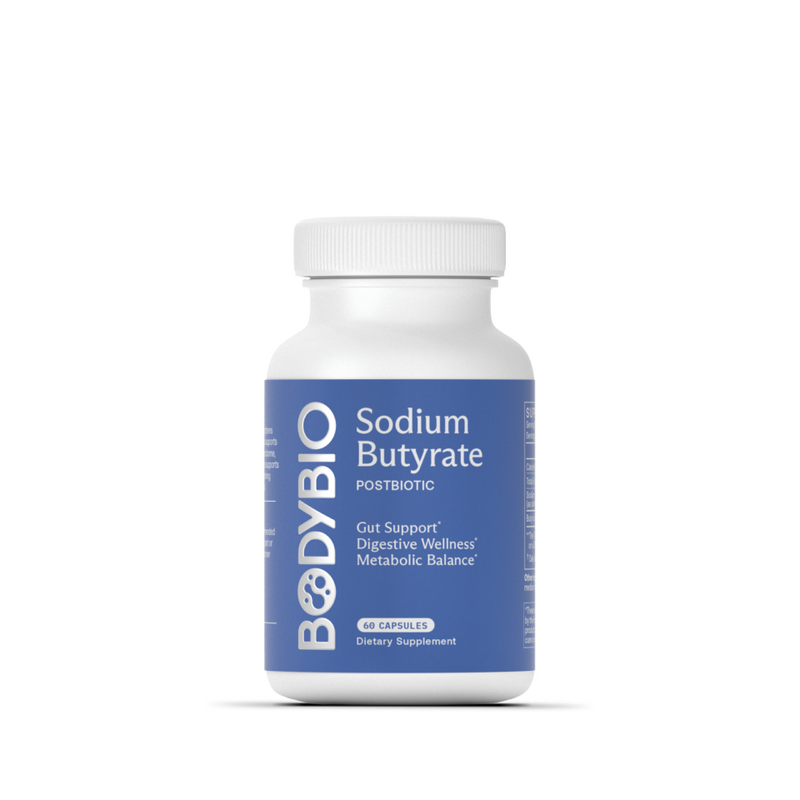Do You Have a Butyrate Deficiency? These Signs Mean Your Gut Health Needs Support
Authors:

Ashley Palmer
Nutritional Therapy Practitioner, Health & Wellness Expert
Key Takeaways:
When people think about gut health, they usually think probiotics and fiber. But there's another key player that's often overlooked: butyrate. Your gut produces thousands of compounds daily, and this short-chain fatty acid is one of the most important for digestive function.
Many people deal with bloating, unexplained fatigue, or brain fog without realizing these symptoms could all connect back to the gut not making enough butyrate. The tricky part is that butyrate deficiency doesn't announce itself with obvious signs. Instead, it shows up as a collection of issues that may seem unrelated. Here's what you should know about butyrate production and how to support it naturally.
Table of Contents:
-
What Is Butyrate and Why Is It Important?
-
Do You Have a Butyrate Deficiency?
-
Causes of Butyrate Deficiency
-
Getting Your Butyrate Back on Track
-
Supporting Your Body's Butyrate Production
What Is Butyrate and Why Is It Important?
Your gut produces thousands of different compounds every day, but one stands out as particularly important for your health: butyrate. This short-chain fatty acid gets made when the good bacteria in your colon break down fiber from your food.
Your colon cells (called colonocytes) run almost entirely on butyrate. While other cells in your body can use glucose or fat for energy, these cells have evolved to depend on butyrate. So when your gut isn't making enough of it, your digestive system really feels the impact.
But butyrate doesn't just stay in your gut. It actually crosses the blood-brain barrier and travels to your brain, where it supports cognitive function. Butyrate's role in brain function includes helping your brain make BDNF (brain-derived neurotrophic factor), an essential protein for memory and learning. It also helps regulate blood sugar and keeps your immune system balanced.
Do You Have a Butyrate Deficiency?
While some specialty labs can test stool samples for butyrate levels, most doctors don't routinely order these tests. Instead, you might notice various symptoms that could include digestive discomfort, energy changes, or brain fog.
Digestive Issues Like Bloating and Irregular Bowel Movements
If you're dealing with persistent bloating after fiber-rich meals, it could mean your gut isn't making enough butyrate. When your gut bacteria can't turn fiber into butyrate efficiently, undigested material ferments and creates gas instead of helpful compounds.
Irregular bowel movements are another common sign. Since butyrate helps maintain your intestinal lining, low levels can disrupt normal digestion, making your bowel movements unpredictable, switching between constipation and loose stools without clear reasons.
Beyond digestive symptoms, low butyrate affects your whole body. Here's what to watch for:
|
Category |
Symptoms |
What It Means |
|
Digestive |
Bloating after fiber-rich meals, irregular bowel movements, increased gas production |
Your gut bacteria may struggle to produce adequate butyrate from dietary fiber |
|
Intestinal Health |
Food sensitivities, digestive sensitivity to previously tolerated foods |
Compromised gut lining due to insufficient butyrate |
|
Metabolic |
Blood sugar fluctuations, increased carb cravings, difficulty with weight management |
Low butyrate affects insulin sensitivity and satiety hormones |
|
Brain & Mood |
Brain fog, difficulty concentrating, memory issues, irritability, anxiety, poor sleep quality |
Reduced butyrate crossing blood-brain barrier and disrupted gut-brain communication |
Increased Intestinal Inflammation and Leaky Gut
Low butyrate can lead to intestinal permeability, or "leaky gut,” when the tight connections between intestinal cells become loose, allowing larger particles to pass through your gut lining. You might notice new food sensitivities or reactions to foods that never bothered you before. Even healthy foods that support gut health, like fibrous vegetables or fermented foods, might cause digestive upset when your gut lining is compromised. Recognizing these signs of poor gut health can help you identify when your intestinal barrier needs support.
Poor Metabolism and Blood Sugar Regulation
When you're not making enough butyrate, you might experience blood sugar swings, energy crashes after meals, or increased cravings for sugary and starchy foods. This happens because butyrate helps regulate hormones involved in blood sugar control and feeling full, including GLP-1 and insulin. Weight management may also become more challenging, and some people find it harder to maintain their weight despite eating and exercising the same way.
Brain Fog and Cognitive Decline
The gut-brain connection means that low butyrate can directly affect how well your brain works. Brain fog, difficulty concentrating, memory problems, and mental fatigue commonly go along with butyrate issues. You might find it harder to focus on tasks that used to be easy, or notice your thinking feels slower than usual. This becomes more concerning as we age, since cognitive decline in seniors often connects to gut health problems. If you're dealing with brain fog, there are other ways to improve brain function that work alongside supporting your gut.
Mood changes like irritability, anxiety, or feeling down may also relate to low butyrate production. Poor sleep is another common issue, since butyrate helps regulate your sleep cycles. This creates a cycle where poor sleep further disrupts gut health and butyrate production.
Causes of Butyrate Deficiency
So why do people develop butyrate deficiency? Most of the time, it comes down to three things:
-
Poor fiber intake: Most people don't consume enough resistant starch found in foods like cooled potatoes, underripe bananas, and legumes
-
Gut microbiome imbalances: Antibiotic use or chronic stress can reduce populations of butyrate-producing bacteria
-
Chronic inflammation: Conditions like IBS or certain medications can disrupt your gut's natural butyrate synthesis
The challenging part is that some symptoms of butyrate deficiency can actually make these root causes worse, resulting in a negative downward spiral of symptoms. Poor sleep and chronic stress don't just happen because of low butyrate; they also mess with your gut bacteria and make it harder to produce butyrate in the first place. Inflammation works the same way. It stops your gut from making butyrate while increasing how much you need. That's why fixing butyrate deficiency often means addressing several issues at the same time.
Getting Your Butyrate Back on Track
To get your butyrate production back where it should be, you need to think about two things: the bacteria in your gut and what you're feeding them. The best results come from combining the right foods with targeted supplements.
The Role of Fiber-Rich Foods and Resistant Starches
Boosting your butyrate production takes a multi-step approach. You need to feed the right bacteria the right foods while creating an environment where they can thrive.
Start with the Right Foods
The ideal way to boost butyrate is by eating more resistant starch. This type of fiber makes it all the way to your colon, where your butyrate-producing bacteria can actually use it. Your best sources include cooked and cooled starches like potatoes, rice, and pasta (the cooling process changes the starch structure). Green bananas and plantains are packed with resistant starch, and legumes like lentils, chickpeas, and black beans give you both resistant starch and protein.
Including butyrate-rich foods in your daily routine gives your gut bacteria the fuel they need. When you're increasing fiber, start slowly, your digestive system needs time to adjust, especially if your gut bacteria are currently out of balance.
Support Your Gut Environment
While fiber provides the raw materials, you also need the right bacteria to do the work. Fermented foods like yogurt, kefir, and cultured vegetables can help, though you might need targeted probiotics for your specific microbiome.
Creating the right environment means more than just taking probiotics. Reducing stress through simple practices, getting enough sleep, and limiting unnecessary antibiotics all help your beneficial bacteria stick around. Postbiotics like butyrate are what your gut bacteria produce when they break down fiber, so supporting these natural processes helps your body get what it needs.
Consider Direct Supplementation
Sometimes you need more immediate support while you're taking steps to rebuild your gut environment. BodyBio Butyrate offers a targeted approach for people with significant deficiency or those who have trouble tolerating high-fiber foods initially. We offer both sodium butyrate and calcium-magnesium butyrate options to suit different dietary needs (though both are equally as effective).
Butyrate benefits include supporting your intestinal barrier, regulating the gut-brain axis, and improving blood sugar control.* Taking supplements with meals can help minimize any digestive sensitivity as you get started.
Supporting Your Body's Butyrate Production
Butyrate deficiency, or low butyrate production, is common but often overlooked, affecting everything from digestion and blood sugar to mental clarity and mood. You can turn this around by eating more resistant starch and supporting the bacteria that make butyrate.
This isn't a quick fix. It typically takes several weeks to see significant improvements as your gut microbiome rebalances. But the benefits of a healthy gut compound over time. Your gut and your gut microbiome is unique to your body, so you might need to adjust your approach based on how your body responds. Some people do well with dietary changes alone, while others benefit from adding targeted supplementation.
Take the first step toward better digestive function and gut health with BodyBio Butyrate.*




